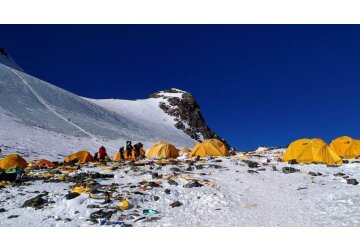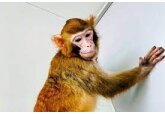
Mount Everest: Climbers will need to bring poo back to base camp
People climbing Mount Everest will now have to clear up their own poo and bring it back to base camp to be disposed of, authorities have said.
"Our mountains have begun to stink," Mingma Sherpa, chairman of Pasang Lhamu rural municipality, told the BBC.
The municipality, which covers most of the Everest region, has introduced the new rule as part of wider measures being implemented.
Due to extreme temperatures, excrement left on Everest does not fully degrade.
"We are getting complaints that human stools are visible on rocks and some climbers are falling sick. This is not acceptable and erodes our image," Mr Mingma adds.
Climbers attempting Mount Everest, the world's tallest peak, and nearby Mount Lhotse will be ordered to buy so-called poo bags at base camp, which will be "checked upon their return".
Where do you poo up a mountain?
During climbing season mountaineers spend most of their time at base camp acclimatising to the altitude, where separate tents are erected as toilets, with barrels underneath collecting the excrement.
But once they begin their treacherous journey things get more difficult.
Most climbers and support staff tend to dig a hole but the higher you go up the mountain, some locations have less snow, so you have to go to the toilet out in the open.
Very few people bring their excrement back in biodegradable bags when climbing Mount Everest's summit, which can take weeks.
Rubbish remains a huge issue on Everest and other mountains in the region, although there has been an increasing number of clean-up campaigns, including an annual one led by the Nepali Army.
'Open toilet'
"Waste remains a major issue, especially in higher up camps where you can't reach," says Chhiring Sherpa, Chief Executive Officer of the non-government organisation Sagarmatha Pollution Control Committee (SPCC).
Although no official figure exists, his organisation estimates that there are around three tonnes of human excrement between camp one at the bottom of Everest and camp four, towards the summit.
"Half of that is believed to be in South Col, also known as camp four," Mr Chhiring says.
Stephan Keck, an international mountain guide who also organises expeditions to Everest, said South Col has gained a reputation as an "open toilet".
At 7,906 metres (25,938 feet) high, South Col serves as the base before climbers attempt to reach the Everest and Lhotse summits. Here, the terrain is very windswept.
"There is hardly any ice and snow, so you will see human stools all around," Mr Keck says.
Authorised by the Pasang Lhamu rural municipality, the SPCC is now procuring about 8,000 poo bags from the US, for an estimated 400 foreign climbers and 800 support staff for the upcoming climbing season that begins in March.
These poo bags contain chemicals and powders that solidify human excrement and make it largely odourless.
On average, a climber is thought to produce 250 grams of excrement per day. They usually spend about two weeks on the higher camps for the summit attempt.
"With that as the basis, we plan to give them two bags, each of which they can use five to six times," Mr Chhiring explains.
"It certainly is a positive thing, and we will be happy to play our part to make this successful," says Dambar Parajuli, president of the Expedition Operators Association of Nepal.
He said his organisation had suggested that this should first be brought in as a pilot project on Everest and then replicated on other mountains too.
Mingma Sherpa, the first Nepali to have climbed all 14 mountains above 8,000 metres, said use of such bags to manage human waste has been tried and tested on other mountains.
"Mountaineers have been using such bags on Mount Denali (the highest peak in North America) and in the Antarctic as well, that is why we have been advocating for it," says Mr Mingma, who is also an advisor to the Nepal Mountaineering Association.
Mr Keck, the international mountain guide, echoed the same message, saying the idea will help to clean up the mountain.
Nepal's central government has announced several mountaineering rules in the past but there has been criticism that many of them have not been properly implemented.
One of the main reasons is the absence of liaison officers on the ground. Government officials are supposed to be with expedition teams at the base camps but many of them have been criticised for not showing up.
"The state has always been missing at base camps leading to all kinds of irregularities including people climbing our mountains without permits," Mr Mingma, chairman of the Pasang Lhamu rural municipality, says.
"This will all change now. We will run a contact office and make sure our new measures, including making climbers bring back their excrement, are implemented."
Bbc.com







